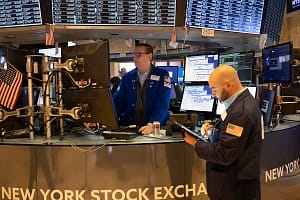U.S. equity markets ended the week on a mixed note, with most major indexes closing modestly lower as investors entered the long Labour Day holiday weekend.
Trading activity was relatively subdued, although small-cap stocks stood out: Russell 2000 posted its third consecutive week of gains, outperforming the S&P 500.
Meanwhile, the Dow Jones Industrial Average touched a new record high midweek before retreating into negative territory by Friday’s close.
Market attention centered on chipmaker NVIDIA’s quarterly earnings. As the world’s most valuable company by market capitalization, its results were closely watched as a gauge of the strength behind this year’s artificial intelligence-led rally. NVIDIA’s earnings topped consensus forecasts, easing recent concerns about overvaluation in the tech sector, though the stock saw some pullback afterward.
Political developments also weighed on sentiment. President Donald Trump announced the dismissal of Federal Reserve Governor Lisa Cook, citing allegations of mortgage fraud. Cook has filed a lawsuit to block the move, raising questions over the independence of the Fed. Meanwhile, Fed Governor Christopher Waller reiterated his call for a 25-basis-point interest rate cut in September and signalled that further cuts could follow over the next six months, citing increased risks to the labour market and slowing economic activity.
Economic data provided a mixed picture. Inflation, measured by the Fed’s preferred core personal consumption expenditure (PCE) index, rose 0.3% month over month in July—unchanged from June and in line with expectations. Consumer spending and personal income grew slightly faster at 0.5% and 0.4%, respectively. The second estimate of second-quarter GDP was revised upward to 3.3% annualized growth, driven by stronger consumer activity and business investment.
However, consumer confidence slipped in August, with the Conference Board index falling to 97.4, reflecting concerns about jobs and income prospects. Initial jobless claims dropped modestly to 229,000, suggesting resilience in the labour market. U.S. Treasuries advanced, with yields on short- and intermediate-term maturities declining, supported by strong auction demand and heightened concerns over Fed independence.
Europe
European markets moved lower, with the STOXX Europe 600 Index down nearly 2% for the week. Investor sentiment was shaken by worries over the U.S. Fed’s independence, renewed tariff tensions, political uncertainty in France, and fading hopes of a resolution to the conflict in Ukraine. France’s CAC 40 led the declines with a drop of more than 3%, while Germany’s DAX and the UK’s FTSE 100 also finished in negative territory.
The European Central Bank’s July meeting minutes revealed internal divisions over the inflation outlook. While some policymakers flagged downside risks linked to slowing growth and a stronger euro, others remained wary of potential upside risks tied to energy and currency volatility. At the Jackson Hole symposium, ECB officials suggested that any immediate rate cut in September is unlikely, though discussions could resume later this year if economic conditions deteriorate.
Fresh inflation data reinforced this cautious stance. Germany’s harmonized inflation rose to 2.1% year on year in August, slightly higher than expected, while Spain’s consumer prices increased 2.7%, unchanged from July. In contrast, France saw inflation ease to 0.8%. The divergence in national data points to ongoing challenges for the ECB in balancing policy decisions across the bloc.
In the UK, retail sales continued their prolonged slump, with volumes declining for the 11th straight month. Shops reported the steepest price increases since late 2023, according to the Confederation of British Industry survey, underscoring persistent cost pressures on consumers.
Asia-Pacific
Japan’s equity markets were mixed, with the Nikkei 225 edging slightly higher while the broader TOPIX fell. Month-end profit-taking and portfolio rebalancing by institutional investors appeared to favour bonds over stocks. The Bank of Japan (BoJ) remained in focus as inflation in Tokyo registered 2.5% in August—still above the BoJ’s 2% target. Coupled with a sharper-than-expected decline in unemployment to 2.3%, the data increased expectations that the BoJ could move toward further rate hikes. Industrial production, however, fell by 1.6% in July, highlighting uneven economic momentum.
In China, mainland equity markets extended their rally, with the CSI 300 up nearly 3% for the week and showing a 10% gain for August. Strong liquidity conditions and rising retail investor participation have driven turnover volumes to record highs, though analysts caution that the rally is liquidity-driven rather than based on fundamental economic strength. Industrial profits declined 1.5% in July—less than feared—thanks to robust performance from technology companies, even as broader indicators like retail sales and factory output signalled a slowdown. Markets now anticipate further policy support measures in September to counter ongoing growth pressures.
Summary
Across global markets, investors balanced optimism over corporate earnings with rising political and policy uncertainty. In the U.S., steady inflation and upwardly revised GDP data point to resilience, yet consumer confidence has softened and Fed independence has come under scrutiny. Europe remains weighed down by uneven inflation trends and political risks, while Asia shows diverging paths: Japan prepares for potential monetary tightening, and China’s markets continue to climb despite signs of economic weakness. Overall, global markets remain highly sensitive to central bank actions and political developments as the final quarter of the year approaches.
Get real time update about this post category directly on your device, subscribe now.




Leave a Comment